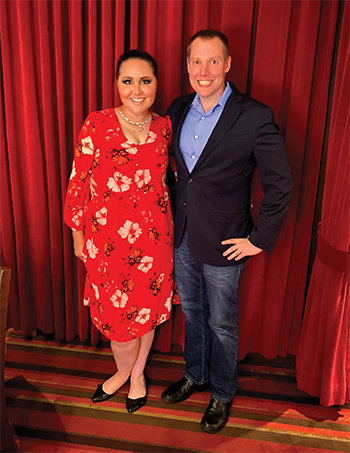Colon Cancer Survivor
Persistence and Positivity Are Must-Haves With Colon Cancer
 Diagnosed with colon cancer at just 29, Courtney Maurer knows firsthand that it can strike at any age. Today, she is considered to be NED (no evidence of disease), and she uses social media to offer support to others whose lives are affected by colon cancer.
Diagnosed with colon cancer at just 29, Courtney Maurer knows firsthand that it can strike at any age. Today, she is considered to be NED (no evidence of disease), and she uses social media to offer support to others whose lives are affected by colon cancer.
My symptoms began two years before I was diagnosed with colon cancer. What took so long? I had a loss of employment that came with health insurance issues. Next, I saw a doctor who felt I was too young to need a colonoscopy. Then, I admit, I got a little scared, so I put it off. Finally, a trip to the emergency room got things rolling.
I was hyperventilating and literally could feel my heart beating in my ears, and I told the ER doctor that I’d also been passing blood. Blood work and a physical exam led to a transfusion right away and a colonoscopy the next morning. The doctor removed some polyps and found a 4.5 centimeter mass in my colon. The biopsy did not indicate that it was malignant, so I was referred to a gastrointestinal doctor to have it and part of my sigmoid colon removed laparoscopically. I was told I may or may not wake up with an ostomy. I woke up without one. I also woke up without my appendix. It was inflamed, so the surgeon took it out, too.
The surgery went well, and on my last day in the hospital, my
doctor and nurse came in to discuss the pathology results with
my fiancé and me. The doctor had removed the mass along with 28 lymph nodes. The mass and one lymph node were cancerous.
Overall, I think I took the diagnosis pretty well. It may sound silly, but I had recently gotten engaged and was planning my wedding, so my first worry was that treatment may cause me to lose my hair (it didn’t!).
We met with an oncologist to discuss possible treatments. Both were chemotherapies. One was oral, the other could be given with a pump. I chose the oral because it sounded easiest, and I had a port placed so I’d have options. The doctor also suggested I talk with a fertility specialist, but it was a lot to digest so I chose not to.
Right before I was supposed to begin chemotherapy, I had CTs of my abdomen and chest to make sure the cancer hadn’t spread. The scans showed spots on my liver and one in one breast. I felt pretty confident the spot in my breast was a calcification that had been there since high school. To make sure, I had a mammogram and an MRI on my liver. The liver spots were cancerous, which changed my diagnosis to Stage IV, but the one in my breast wasn’t. Small win!
I moved forward with the oral chemotherapy, and my body did not like it. I couldn’t keep a thing down. After being hospitalized for a few days, I started chemotherapy through my port and a pump. I had no problems at all. I was even able to go to work.
Tests around the sixth treatment showed that my body was responding very well to the treatment. Scans of my liver showed no signs of cancer, but the tumor board still recommended a liver resection to be on the safe side. My doctor stopped my chemotherapy for three months, and I had surgery that removed a small liver tumor and about 65 percent of my liver.
I resumed chemotherapy and began to have extreme neuropathy around the eighth treatment. I told the doctor I was done, but he disagreed. To give me some relief, he made adjustments to the medications, and I finished with chemotherapy not long after.
Positivity was so important. I didn’t think I would be strong, but apparently I was. I was more worried about my fiancé, but he hung in there with me and was my main caregiver. I tried to put on a happy face, even when side effects got in the way of eating and working — two very important things! I discovered a few things that worked for me: spicy Indian food helped get rid of the metallic taste in my mouth from chemotherapy, sucking on peppermints helped relieve the nausea, and eating watermelon boosted my low potassium level. To deal with the emotional challenges of treatment, I blogged and met with my nurse who prescribed anti-depressants. Both were very helpful.
A month after my last treatment, I was declared NED (no evidence of disease). I got married later that year. Now I am involved in advocacy through Fight Colorectal Cancer and am super excited to have a strong presence on social media. I support fundraising for more research and encourage people to get screened.


